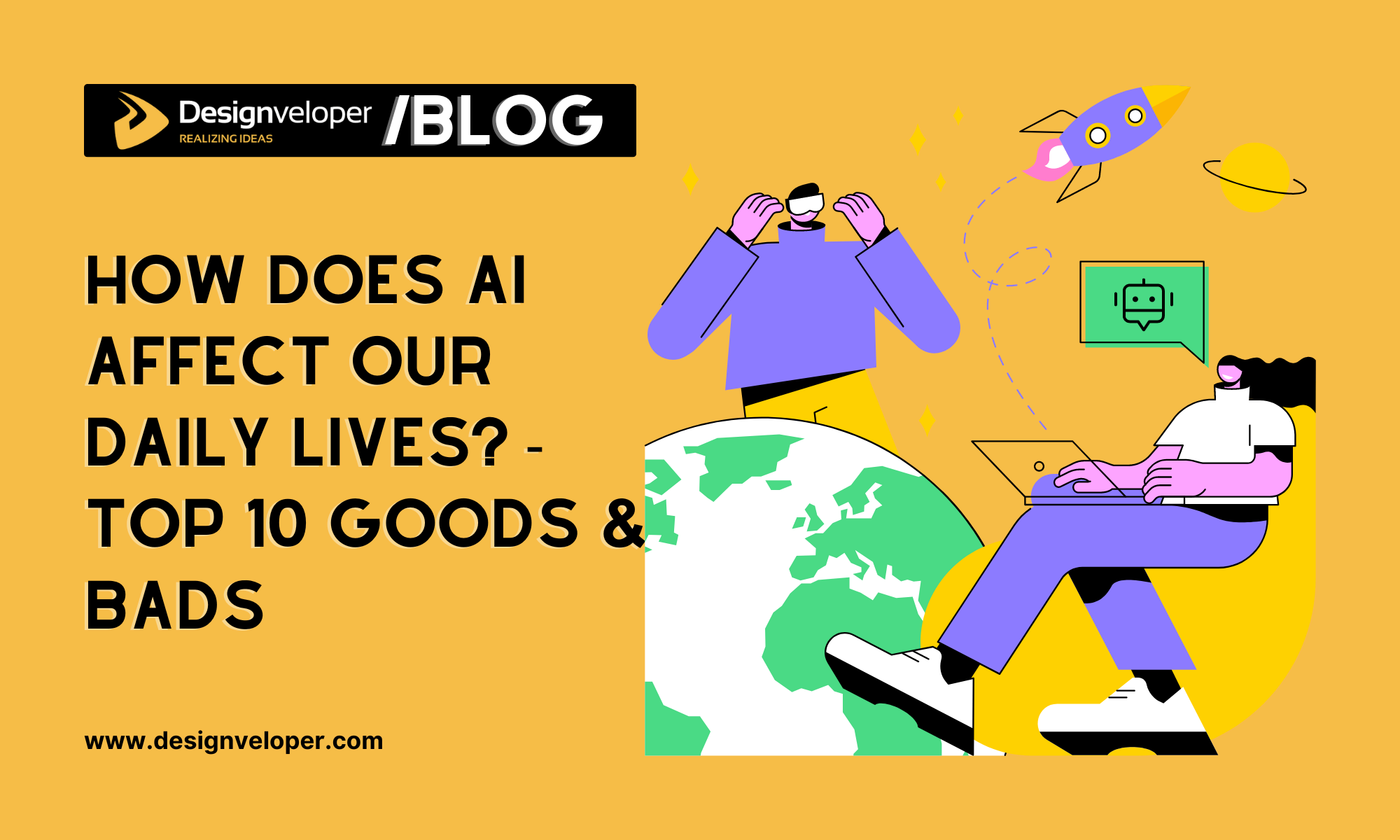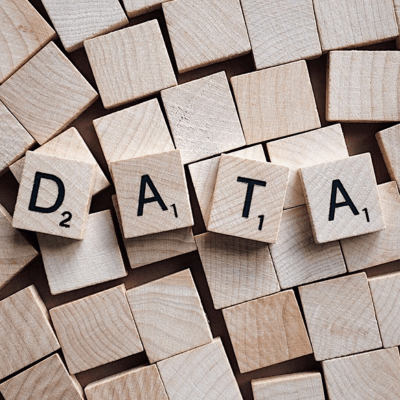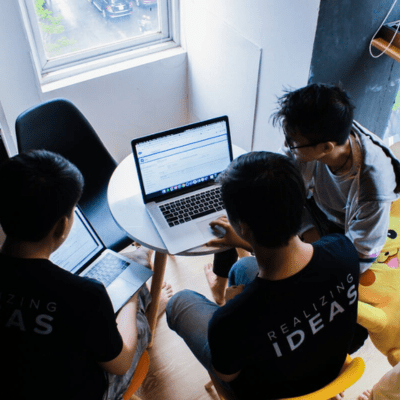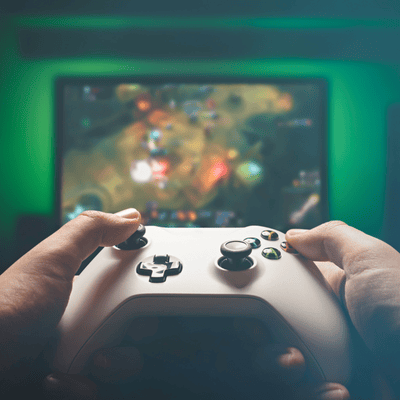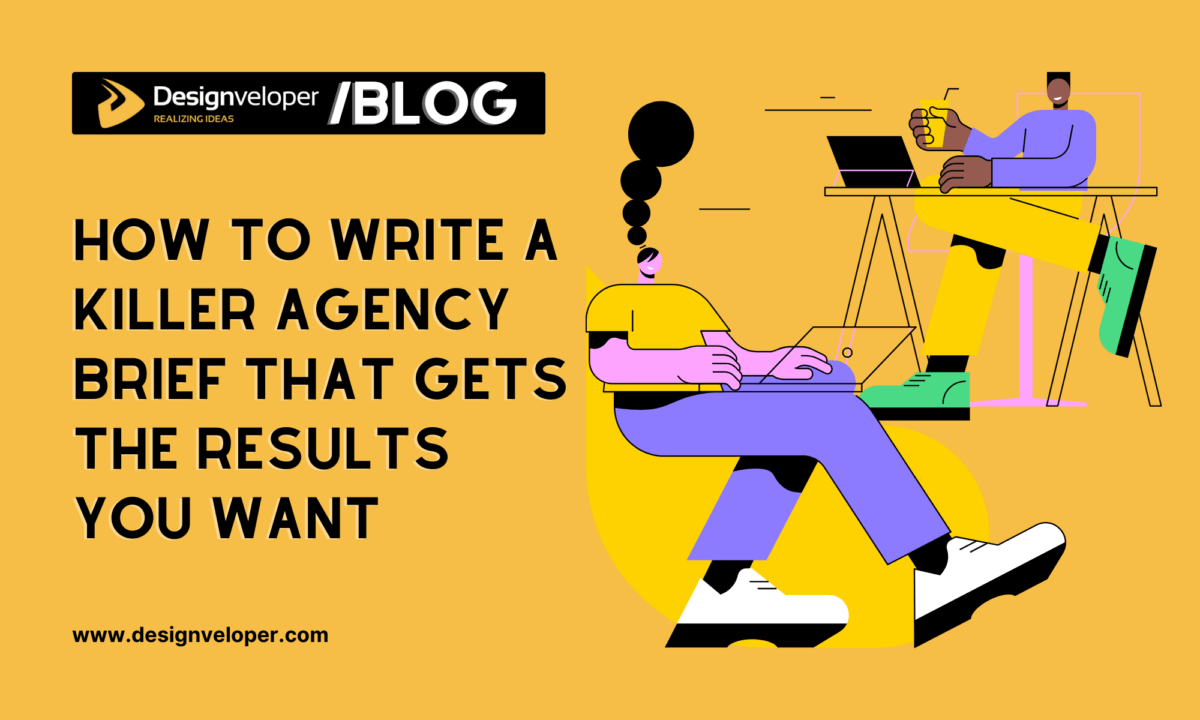
Artificial Intelligence plays an increasingly important role in every aspect of life. But how does AI affect our daily lives? This question is what many of us are asking.
So, this article is here to discover the top 10 positive impacts of AI on all facets of our lives. From how we work and play to how we learn and communicate, AI appears as a big help. But it’s not all good news. AI also accompanies potential challenges that you need to understand and handle.
Now, keep reading!
How Does AI Affect Our Daily Lives Positively?
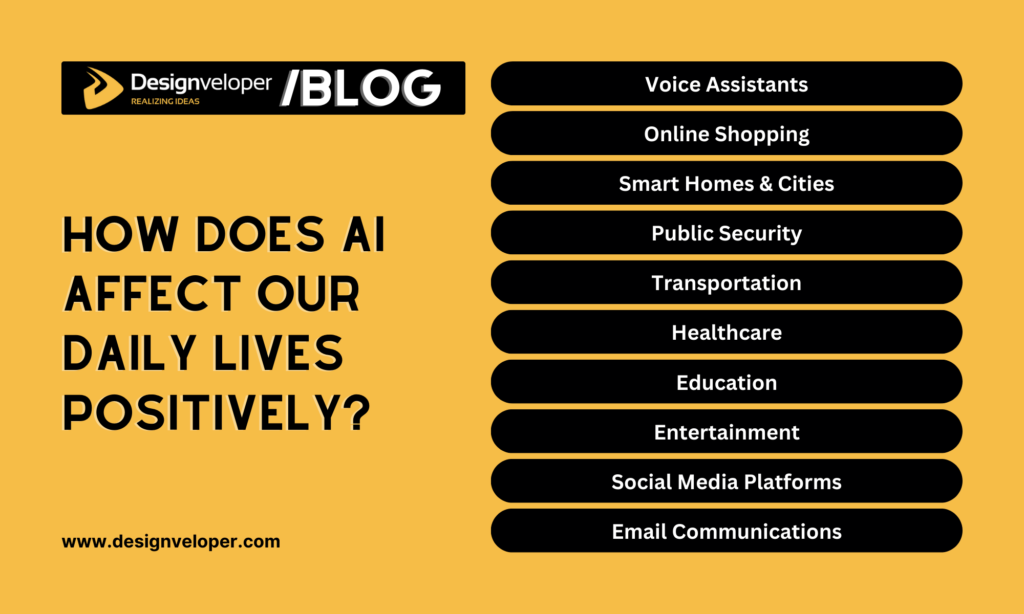
First, let’s dive into the top 10 positive impacts AI is exerting on our lives.
Voice Assistants
Artificial Intelligence has transformed the way we interact with devices, especially smartphones, through voice assistants. Some popular companions, like Siri, Google Assistant, or Alexa, provide a hands-free and personalized experience and become integral in our daily routines.
AI-powered voice assistants can help us manage our tasks and time efficiently. According to Vixen Labs, most people use these assistants to update news, listen to music, and search for news.
Besides, they can support messaging, set reminders, edit photos, control smart home devices on our behalf, or even translate a phone call in real-time. All can be done with our voice commands. This level of convenience makes them a staple for many people, especially those with visual impairments or mobility issues.
This wide adoption, coupled with advancements in voice recognition tech, propels the global voice assistant market. Accordingly, it’s projected to reach USD 38.5 billion by 2031, with a CAGR of 26.45% since 2023.
Online Shopping
AI has increasingly made online shopping experiences more personalized, enjoyable, and efficient.
Customers from six countries believed that AI improved price comparison (50%), online search for deals (46%), and relevant product recommendation (41%). Accordingly, AI algorithms analyze vast amounts of data (e.g., competitor prices or browsing patterns) to return suitable outcomes for our requests or display our preferred products.
Besides, such companies as Amazon and Google introduced AI-powered visual search. This capability allows us to find products using images without knowing their exact names or details.
Also, AI powers chatbots that provide instant customer service. As human agents can’t be available 24/7, these virtual assistants can help you answer common inquiries, offer product information, and help with transactions. This provides you with a seamless shopping experience.
Smart Homes and Cities
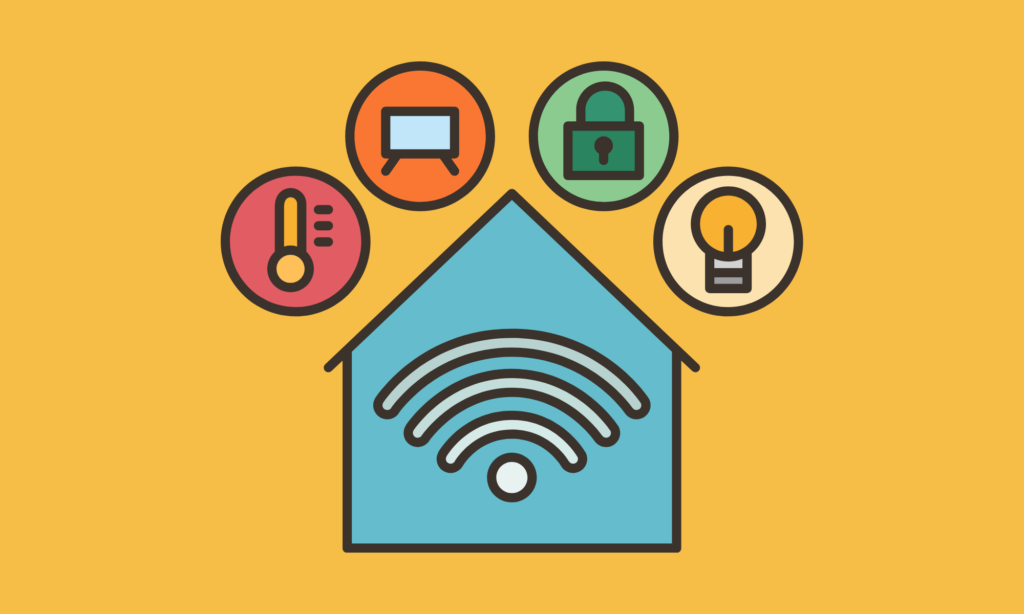
Consumer spending on smart home devices will reach USD 200 billion in 2027, a roughly 59% increase from 2022. As AI and other advanced techs like IoT evolve, these devices can be more intelligent and popular.
But how does AI affect our daily lives when homes and cities become smarter?
First, AI-powered devices like Amazon Echo, Google Nest, and Apple HomePodcan can turn our homes into convenient and comfortable places.
They can control temperature, lighting, security systems, and even some household appliances. They learn from our preferences over time and enable more personalized automation. Therefore, your home can warm up in the winter or play music when you want to relax.
Besides, AI also plays a pivotal role in making cities smart and sustainable. One standout example is smart meters. By constantly analyzing and monitoring energy usage, these meters can offer city administrators instant data for optimal energy consumption and cost savings.
Further, AI, coupled with other techs, helps cities like San Francisco or Copenhagen reduce overflowing waste, manage traffic to improve air quality, manage leakage, and more.
Public Safety and Security
The global market for AI in video surveillance is predicted to reach USD 16.3 billion in 2028, after a nearly 28% increase from 2023.
The development of deep learning and computer vision and the increasing need for developing smart cities have driven the wide adoption of AI-powered security cameras.
By integrating AI-based analytics, human operators can effectively monitor big data and analyze video footage instantly to discover unusual activities and alert authorities. This can help prevent crimes, respond to incidents more quickly, and foster overall public safety.
Transportation
The advent of self-driving cars is one typical breakthrough in transportation enabled by AI. Such AI advances as machine learning, computer vision, and sensor fusion help these vehicles automatically recognize traffic signs, navigate through traffic, and more.
With this capability, creators expect these cars to minimize accidents caused by human errors and enhance fuel efficiency. This also contributes to increases in autonomous vehicles, with a forecast quantity of over 125k units by 2030.
Moreover, the integration of AI into GPS systems boosts their ability to analyze real-time traffic data, estimate the fastest and most convenient routes, and deliver precise arrival times. They can predict traffic jams and recommend alternative routes. This makes our journeys smoother and more efficient.
Healthcare
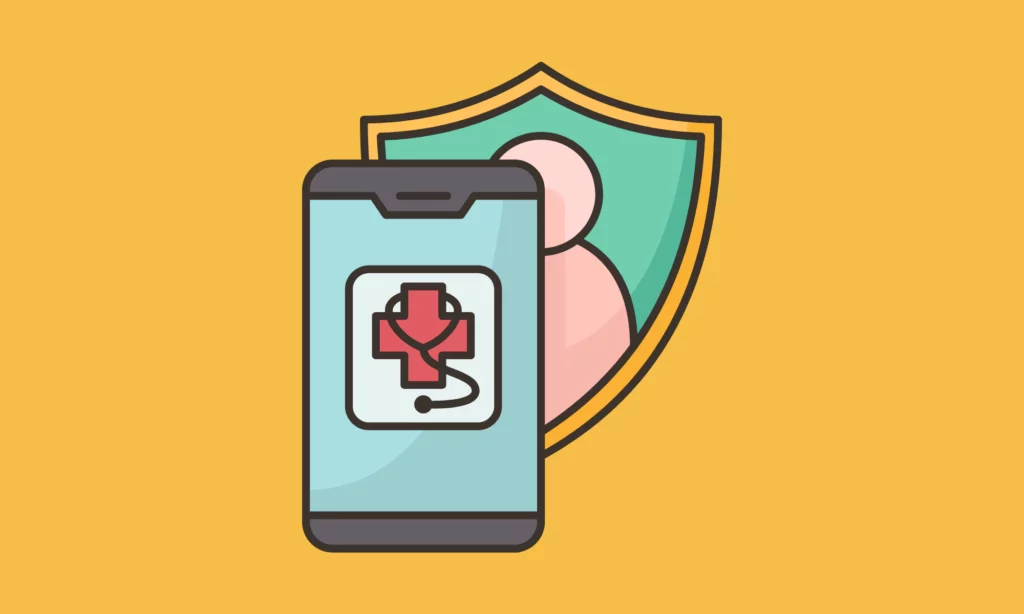
AI is positively affecting healthcare by enabling proactive health management, improving patient care, and speeding up medical research.
Here’s how:
First, AI-powered wearables like Garmin or Fitbit act as our personal health monitors. They track numerous health metrics (e.g., physical activity levels or heart rate) and AI algorithms will analyze these metrics to provide insights into our health and suggest lifestyle improvements.
Plus, healthcare providers also use AI to revolutionize patient care and disease diagnosis. AI algorithms can analyze data collected from wearables or electronic health records to detect health risks and help doctors build informed treatment plans.
In medical research, AI can accelerate disease diagnosis and drug discovery. Through rigorous data analytics, for example, AI can identify early signs of chronic diseases like cancer and biological targets for drug development, often with higher speed and accuracy.
Education
AI has been affecting different aspects of the education sector. According to Forbes Advisor, 60% of educators adopt AI-based tools in classrooms to support their teaching and enhance educational outcomes. These tools mainly include academic games for target learning (51%) and platforms like Knewton for custom learning activities (43%).
Further, they also invest in AI-enabled systems for automatic grading, planning, and administration. They leverage advanced techs (e.g., natural language processing) to evaluate each student’s academic achievements based on predefined standards and rules.
Even higher education institutions offer chatbots to support students in admissions, course information, student services, and more. Besides, educators also use intelligent tutoring systems (like Duolingo) to provide students with one-by-one tutoring experience in single subjects like language or Maths.
Entertainment
AI is also widely adopted in entertainment. So how does AI affect our daily lives when it comes to entertainment?
Today, streaming platforms like Netflix, YouTube, and Spotify offer AI-powered recommendation systems to analyze our viewing or listening habits. Then, these systems will suggest content that fits our preferences. This helps improve our entertainment experience.
In recent years, we’ve also witnessed the gradual growth of AI in video games, with a projected CAGR of 26.8% from 2023 to 2032.
Accordingly, game developers use AI to build intelligent non-player characters (NPCs) and enhance game graphics. Besides, AI can also procedurally generate game content (e.g., game levels, environment, or gaming assets), support player experience modeling, and more.
All these make games more immersive and provide a unique experience for game players.
Email Communications
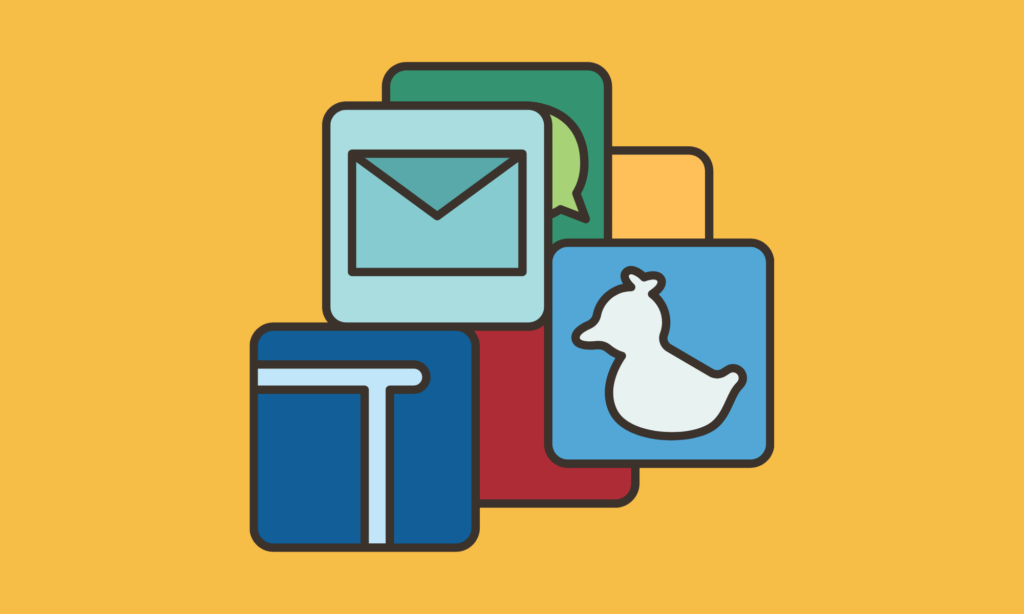
AI has significantly improved the way we write and manage emails.
First, machine learning algorithms can predict your responses or complete sentences whenever you type an email. These “smart replies” and “auto-completion” features save you much time and effort.
Furthermore, AI also powers the email scheduling functionality. This allows you to send emails at optimal times based on the recipient’s past email activity and time zone. Accordingly, AI helps increase the possibility of your emails being read.
Another common AI use in emails is spam filtering. Such software as Vade Secure leverages AI algorithms to analyze the content, sender information, and other email metadata. They then can detect and filter out spam, protecting us from unwanted emails and potential phishing attacks.
AI can classify our emails (e.g., personal emails or social notifications) into different tabs based on their content and importance. This makes our mailbox more organized and manageable.
Social Media Platforms
Top-tier social networking platforms leverage machine learning, deep learning, and NLP to improve online social experiences.
Like Netflix or Spotify, these AI techniques also analyze our online interests, social connections, and activities to suggest relevant content, products to buy, and people to follow.
Also, AI helps identify and filter our improper content, hate speech, and online harassment to make social media platforms safer. Moreover, AI supports targeting ads to the right users by analyzing their past behavior and activities.
Does AI Negatively Affect Our Daily Lives?
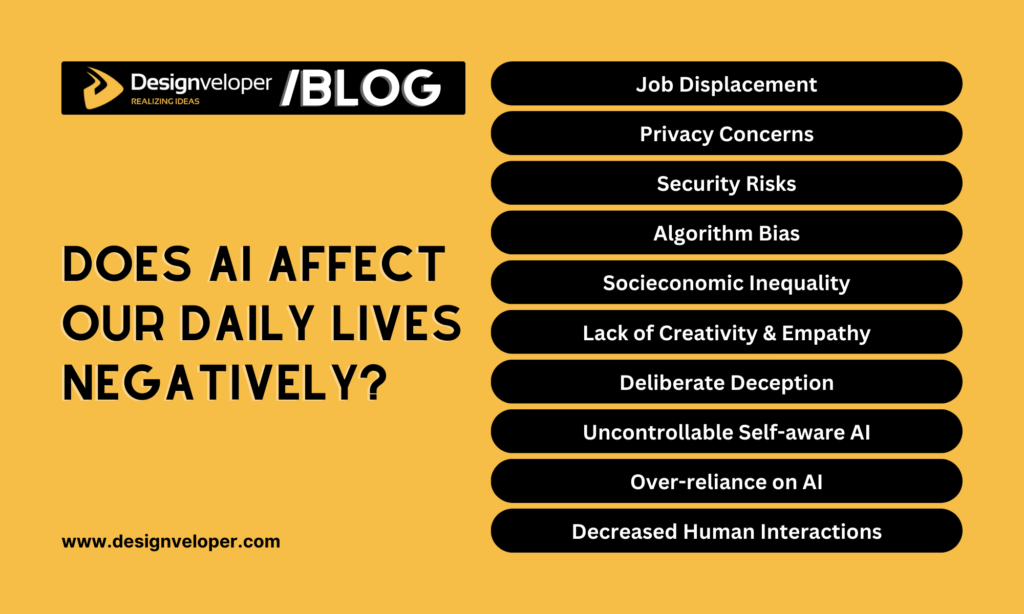
The answer is yes. Despite those positive impacts, AI isn’t without challenges. So how does AI affect our daily lives adversely? Let’s find ten visible problems you may encounter when AI is increasingly popular:
Job Displacement
AI is a double-edged sword. It could either create new jobs as AI and machine learning specialists or lead to job displacement in certain sectors.
For example, 1.7 manufacturing workers have been laid off since 2000 due to the introduction of AI-powered machines and robots that take over their jobs. Other jobs that handle repetitive tasks can be highly automated by AI, like office & admin support.
According to the World Economic Forum, 83 million jobs will be lost, versus 69 million new jobs created by AI. This could exacerbate the global unemployment rate.
Privacy Concerns
AI systems often require vast amounts of data for training and analytics. However, not all the systems track and analyze sensitive personal data or confidential information with formal consent. This may raise concerns about privacy violations.
Facing this AI-induced problem, most people (81%) were uncomfortable with how companies use AI to collect and analyze their personal information.
Security Risks
Apart from privacy concerns, AI systems can be vulnerable to hacking and other security risks.
In 2019, a group of Chinese white hackers reported how they tricked the Autopilot self-driving system of a Tesla Model S to change lanes. This worried lots of people, including AI users and developers, about AI’s security.
Without being safely controlled and protected from attackers or malicious activities, AI systems can cause data breaches, service disruption, financial losses, and even physical harm.
Algorithmic Bias
Like humans, AI models “learn” from the training data from various sources (e.g., social media platforms or customer relationship management). But nothing can ensure these data sources are high-quality and trustworthy.
One 2019 study found that a healthcare risk-prediction algorithm displayed racial bias due to a faulty metric it relied upon. This highlights the AI model may produce unfair or misleading outcomes (e.g., unfair loan approvals or racial discrimination in hiring practices) if the training data is biased or faulty.
Socioeconomic Inequality
AI potentially exacerbates socioeconomic inequality. One recent research stated that AI could worsen cross-country and within-country inequality in terms of capital income and wealth.
The culprit behind this is that AI systems increase job displacement and the growing demand for AI capital which includes hardware, software, expertise, and even data.
As more organizations want to invest in this AI capital for their increasing use, its owners (AI companies or investors) will benefit from capital returns. This means top earners will become much wealthier from the development of AI, but also exacerbate wealth disparity.
Lack of Human-like Creativity and Empathy
Although AI can mimic some human behaviors, it lacks human-like empathy and creativity.
For example, while an AI-powered chatbot can provide customer service, it can’t understand and respond to emotional cues like human agents.
This can reduce its effectiveness in offering personalized and empathetic customer interactions.
Use of AI for Deliberate Deception
There’s a risk that AI could be used for deliberate deception, such as creating deepfakes. These are AI-produced videos or images that impersonate someone saying or doing something they never did.
With advancements in AI algorithms, the number of deepfake videos, especially about pornography, soared by 550% between 2019 and 2023. These videos can lead to a person’s reputation damage or even physical harm.
Uncontrollable Self-aware AI
Leading AI researchers thought that there was at least a 10% chance for AI to reach out of human control in the future.
While this is currently more of a speculative concern, it’s still what they keep in mind when AI evolves. If this is the case, we may have to face unpredictable consequences.
Decreased Human Interaction
When humans get familiar with AI taking over more tasks, human interactions might reduce afterward. It’s because they can have fewer opportunities to communicate with others and develop their social skills.
A lack of soft skills can be a minus, as it can lead to a decrease in effective communication and an unpleasant work environment.
Over-reliance on AI
When AI advances, many people become too dependent on this advanced tech for various business functions and routine tasks. This possibly reduces their critical thinking, problem-solving, and creativity.
For example, if you rely too much on an AI-powered GPS system, your spatial recognition may decrease. This means you’re less likely to remember the route you took or even navigate without this intelligent system.
Conclusion
We’ve answered the question “How does AI affect our daily lives?” in both positive and negative terms. From voice assistants to smart cities, AI is everywhere around us. But the impact of AI isn’t entirely rosy. It can lead to job loss, privacy concerns, and more.
Do you want to learn more about AI and how it shapes our future? Follow our blog to receive more updates about this amazing tech.






Read more topics




























